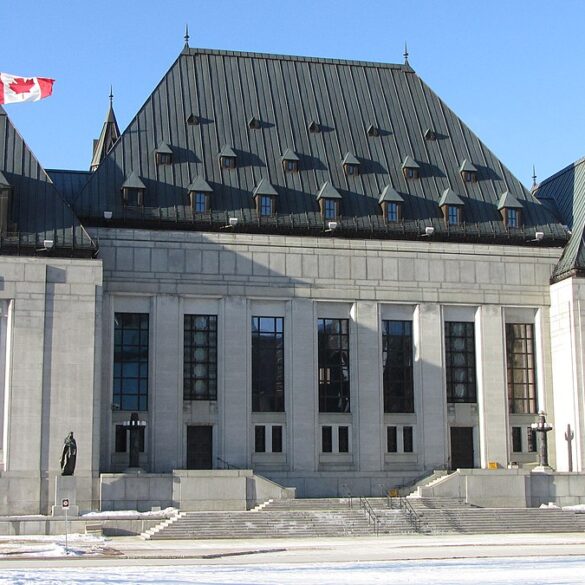
The Supreme Court of Canada is seen in Ottawa in 2010. (D. Gordon E. Robertson/CC BY-SA 3.0)
Ottawa is asking the Supreme Court of Canada to set limits on the manner in which provincial governments can use a controversial clause in the Charter of Rights and Freedoms.
Section 33 of the Charter, known as the Notwithstanding clause, permits provincial governments to override specific provisions of the Charter by enacting a law, which simultaneously prevents judicial review of the legislation in question for five years.
Federal Justice Minister and Attorney General Sean Fraser announced on Sept. 18 that he filed a factum with the Supreme Court outlining the government’s “position on constitutional issues raised” by the usage of the clause. Fraser said the case is about more than the immediate issues before the court and will determine how federal and provincial governments use the clause “for years to come.”
Ottawa’s submission to the Supreme Court said the court should set limits on when the notwithstanding clause can be invoked, arguing its repeated usage amounts to “indirectly amending the Constitution” and that it’s the equivalent of “ denying its very existence.”
The clause is being examined as part of a landmark case on Quebec’s secularism law, known as Bill 21. That law bans teachers, judges, police officers, and jail guards from wearing religious symbols while working, and strikes down an exemption for English school boards that was created by a lower court judge.
Quebec’s highest court unanimously upheld Bill 21 as constitutional in February, and said a lower court was wrong to exempt the English school board from the law. Quebec Premier François Legault spoke out after the court’s decision, saying he would not shy away from using the clause.
Bloc Québécois Yves-François Blanchet addressed “speculation” during Question Period on Sept. 17 that the government would soon table an “attack on the notwithstanding clause in the Constitution.” He asked whether Ottawa would respect the “right of Quebec and the provinces” to invoke the clause.
Prime Minister Mark Carney responded that one of the most important duties of the federal government is to defend the Charter, noting that the Supreme Court will decide whether the repeated usage of the notwithstanding clause is legal.
When Blanchet accused Carney of “attacking” the legacy of former Prime Minister Pierre Elliot Trudeau, who was the main force behind the Charter’s creation, Carney again responded that the decision about the notwithstanding clause would be decided by the Supreme Court and “not by the members of Parliament from Quebec or anywhere else in Canada.”
The clause has seen usage by other provinces in recent years. Ontario invoked the clause in June 2021 to limit third-party election financing, and again in 2022 when negotiating a new contract with 55,000 Ontario education workers, but repealed it days later. The province also threatened its use in 2018 when reducing the number of city council seats in Toronto.
Saskatchewan invoked the clause in October 2023 to pass its Parents’ Bill of Rights, which required schools to obtain parental consent before using the preferred name or gender identity for youth under 16.
Alberta Premier Danielle Smith has also said she won’t rule out using the clause to nullify challenges to her government’s legislation restricting gender transition for minors.
While the federal government has never used the notwithstanding clause, Conservative Leader Pierre Poilievre said in April 2024 that he would tackle crime by using “whatever tools the Constitution allows me to use to make them constitutional.” Then, in early 2025, the Tory leader said he would use the notwithstanding clause to impose consecutive life sentences on those who commit multiple murders.
Canadian Constitution Foundation counsel Josh Dehaas recently said Ottawa’s request for the Supreme Court to rule against the repeated usage of the notwithstanding clause is “out of left field” and would “upend Quebec’s common practice of repeat invocations of the notwithstanding clause.”
Queen’s University Law Professor Bruce Pardy said that in a system of judicial supremacy, “the Court, not the Constitution, rules.” He previously told The Epoch Times that the increasing usage of the clause was in reaction to courts using the Charter to create policy and act similar to legislatures, and that the clause is the “last remnant of legislative supremacy” allowing Parliament or provincial legislatures to pass laws instead of courts.
Other groups, such as the Canadian Civil Liberties Association (CCLA), have raised concerns about the repeated use of the clause.
“In recent years, some provincial governments have increasingly used this clause to override basic rights and freedoms and try to prevent courts from striking down horrendous rights violations as unconstitutional,” Anaïs Bussières McNicoll, director of CCLA’s Fundamental Freedoms program, said in December 2024.
Matthew Horwood is a reporter based in Ottawa.
